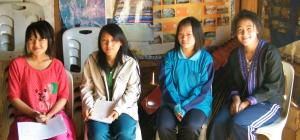Thailand
Thailand: Hosted by the Karen of Ob Luang
The pilot Assessment in Ob Luang National Park in the northern province of Chiang Mai took place in January/February 2012 at the request of the Karen indigenous people and with the collaboration of the Department of National Parks, Wildlife and Plant Conservation (DNP).
In Ob Luang, the park authorities, local communities and NGOs have been working together since 2004 to develop and put in place a joint management system. The Whakatane Assessment was requested by the local indigenous people in order to show this positive example of co-management and ensure that best-practice policies continue in Ob Luang and are replicated elsewhere in Thailand.
The pilot Whakatane Assessment was carried out by a team of indigenous people as well as nearly all of the institutions with an interest in Ob Luang: the Inter Mountain Peoples Education and Culture in Thailand Association (IMPECT), Thailand’s DNP, FPP, IUCN, local NGOs, the Watershed Network and Highland Nature Conservation, Chomthong. They spent several days visiting communities in the park and local government staff to hear their views and recommendations.
The team found that the joint management approach was supported by everyone due to its visibly positive effects for the communities and the conservation work, including reduced tensions between the government and communities, increased protection of forests and watersheds, and improved livelihood security for indigenous peoples and local communities.
Unfortunately, Ob Luang is only one of a limited number of national parks in Thailand where joint management practices are actively promoted. Joint management practices which allow people to live inside national parks go against some outdated laws, so the majority of communities and indigenous peoples living in Thailand’s parks are still considered to live there illegally. This is why those involved in the joint management of Ob Luang wanted to use the pilot assessment to inform and reinforce the case for reforming old national laws and policies to enable this type of successful experience to be replicated and scaled-up in other protected areas.
A national forum to review the findings of the pilot Whakatane assessment at Ob Luang National Park and identify a possible path for promoting the new conservation paradigm in Thailand was held on 26–27 April 2012. The main recommendations from the forum were as follows:
• Continue supporting joint management practices in Ob Luang, i.e. strengthening collaboration between indigenous people, local communities, park authorities and other stakeholders, emphasising nature conservation and environmentally friendly income generation.
• Request DNP to adapt and replicate Ob Luang’s joint management approach to other national parks and wildlife sanctuaries nationwide.
• As reform of the existing law is still problematic, efforts are recommended to develop a special law or policy on joint management of protected areas.
• Advocate for deeper decentralization of natural resources management to local authorities.
